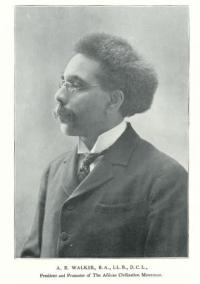Abraham Beverley Walker

Photo: Message to the Public by Dr. A. B. Walker
Abraham Beverley Walker was born 23 August 1851 in Belleisle, New Brunswick to parents William Walker and Patience Taylor. Walker was of Loyalist descent, the first Black student to enroll at Saint John Law School (now the Faculty of Law at the University of New Brunswick), the first Canadian-born Black lawyer in Canada, and the first Black New Brunswicker to publish a magazine ("Abraham Beverley Walker"). The title of his magazine was Neith: A Magazine of Literature, Science, Art, Philosophy, Jurisprudence, Criticism, History, Reform, Economics (1903–1904). Neith was the first African-Canadian literary magazine, and was founded in New Brunswick (Johnson).
As a teenager, Walker worked as a stenographer and secretary before moving to Washington, D.C. to attend National University, where he obtained a Bachelor of Laws. After completing his degree he moved back to Saint John, New Brunswick, where he undertook a three-year studentship at the office of lawyer George Godfrey Gilbert (Cahill, “Walker”). Upon completing this studentship, Walker opened his own law office in Saint John, where Blacks comprised only 1.2% of the population at the time. When his law office proved unsuccessful, he moved back to the United States, staying for two years (Cahill “Walker”). In June 1881, he was recognized as an attorney by the Supreme Court of New Brunswick, and called to the bar in 1882, thus making him the first Canadian-born Black lawyer. In 1892, a decade after being called to the bar, he graduated from Saint John Law School with his second degree in law (MacKinnon). He was the first Black student to graduate from Saint John Law School, and it would be another seventy years before the next Black student would graduate from UNB Law (“Abraham Beverley Walker”). Walker later claimed to have obtained a Doctorate of Civil Law, but there is little agreement as to where he obtained this degree (Cahill, “First Things” 370).
Walker faced racial discrimination throughout his career, the most acute example being when he failed to be appointed as a Dominion Queen’s Counsel. In 1895, a number of Black voters petitioned the Conservative Minister of Justice, Sir Charles H. Tupper, to appoint Walker as a Q.C. Both Walker and the petitioners were assured that he would make the list once it was finalized. However, in 1896, when the list became public (two days after the new Liberal government took office), Walker was not listed. Walker stated: “They appointed Barristers who had as a matter of fact left the practice of law altogether [. . .] I was left off simply because I was a coloured man and nothing else” (qtd. in Cahill, “First Things” 374).
Walker devoted much of his life to racial issues, and while he is praised for being the first Black person to accomplish many things in New Brunswick and Canada, he has also been criticized for the extent to which he advocated for Black rights, as J.B. Cahill observes:
Psychologically as well as ideologically a black supremacist, Walker argued for black rights on the basis not so much of racial superiority as of racial antiquity: he claimed the Afro-Canadian pedigree was ancient Egyptian. In doing so, he simply inverted white racist arguments for the separate and unequal treatment of black people. (Cahill, “Walker”)
Critic W.A. Spray agrees, stating that Walker's investment in solving the “Negro Problem” was manifest in “remov[ing] many Black people from the United States and Canada and [resettling] them in Africa” (Spray 66), an outcome that Walker’s magazine Neith sought to achieve. It was Walker’s hope, continues Spray, to have educated, Anglicized members of the African diaspora in Britain, Canada, the USA, and the Caribbean colonize a model colony in British Africa. Furthermore, he hoped that this model colony would be the beginning of an African empire. After the end of Neith in 1904, Walker spent his energy working towards this goal with the African Civilization Movement. He spent time travelling and lecturing across Canada and the United States, and was lecturing in Ontario when he died of tuberculosis on 12 April 1909.
A.B. Walker remains an important historical figure for New Brunswick and Canada alike because he was the first Black Canadian to attend Saint John Law School, practice as a lawyer in Canada, and publish a magazine. On 30 October 2019, he was honoured posthumously with the Order of New Brunswick (MacKinnon), speaking to the fact that he made a lasting impact in fighting against racial discrimination through both political and literary outlets.
Emma Rhodes, Fall 2019
St. Thomas University
Bibliography of Primary Sources
Walker, A.B. Neith 1 (Feb. 1903). Ed. James W. Johnson. Wix.com. 2018
<https://billyjohnson10.wixsite.com/neith/neith-1-1-1>.
---. Neith 2 (Mar. 1903). Ed. James W. Johnson. Wix.com. 2018
<https://billyjohnson10.wixsite.com/neith/neith-1-2>.
---. Neith 3 (July 1903). Ed. James W. Johnson. Wix.com. 2018
<https://billyjohnson10.wixsite.com/neith/copy-of-neith-1-2>.
---. Neith 4 (Aug. 1903). Ed. James W. Johnson. Wix.com. 2018
<https://billyjohnson10.wixsite.com/neith/neith-1-1 >.
---. Neith 5 (Jan. 1904). Ed. James W. Johnson. Wix.com. 2018
<https://billyjohnson10.wixsite.com/neith/copy-of-neith-1-4>.
Bibliography of Secondary Sources
“Abraham Beverley Walker (1851–1909), The First Canadian-Born Black Lawyer in Canada (1881); the First Black Law Student Enrolled at UNB; the First Black New Brunswicker to Publish a Magazine (1903).” New Brunswick Black History Society. 2019
<https://www.nbblackhistorysociety.org/professionals.html>.
Cahill, Barry. “First Things in Africadia; or, the Trauma of Being a Black Lawyer in Late Victorian Saint John.” University of New Brunswick Law Journal 47 (1998): 367-380.
---. “Walker, Abraham Beverley.” Dictionary of Canadian Biography. Vol. 13. Toronto, ON: U of Toronto P, 1994. Dictionary of Canadian Biography Online. 2003. U of Toronto/U Laval. 24 June 2020
<http://www.biographi.ca/en/bio/walker_abraham_beverley_13E.html>.
Johnson, James W. “Abraham Beverley Walker (1851–1909): Founding Editor and Manager.” Neith: A Magazine of Literature, Science, Art, Philosophy, Jurisprudence, Criticism. 2018. Wix.com. 2019
<https://billyjohnson10.wixsite.com/neith/chill-pill>.
MacKinnon, Bobbi-Jean. “‘Righting a Wrong’: 1st Canadian-Born Black Lawyer Named to Order of New Brunswick.” CBC New Brunswick. 11 Aug. 2019. Canadian Broadcasting Corporation. 24 June 2020
<https://www.cbc.ca/news/canada/new-brunswick/abraham-walker-first-black-lawyer-saint-john-order-of-new-brunswick-1.5242025>.
Spray, W.A. Blacks in New Brunswick. Fredericton, NB: Brunswick Press, 1972.


